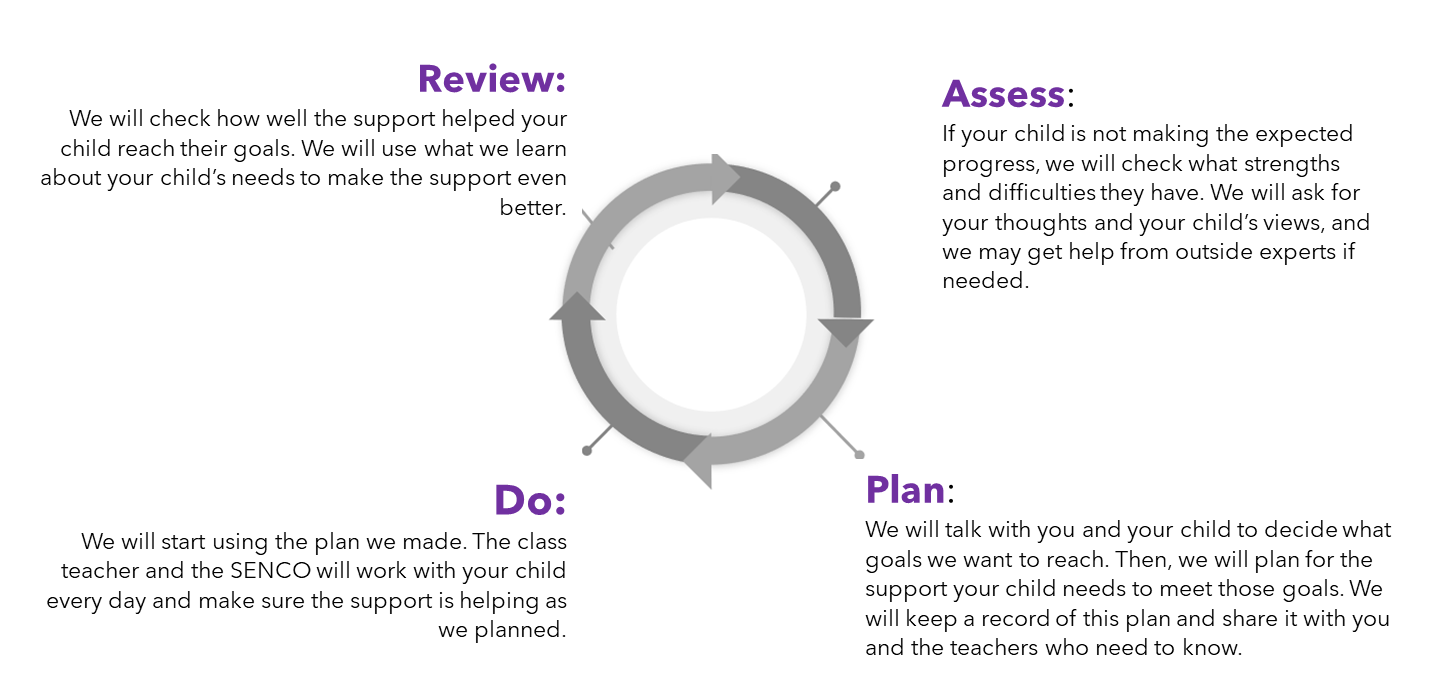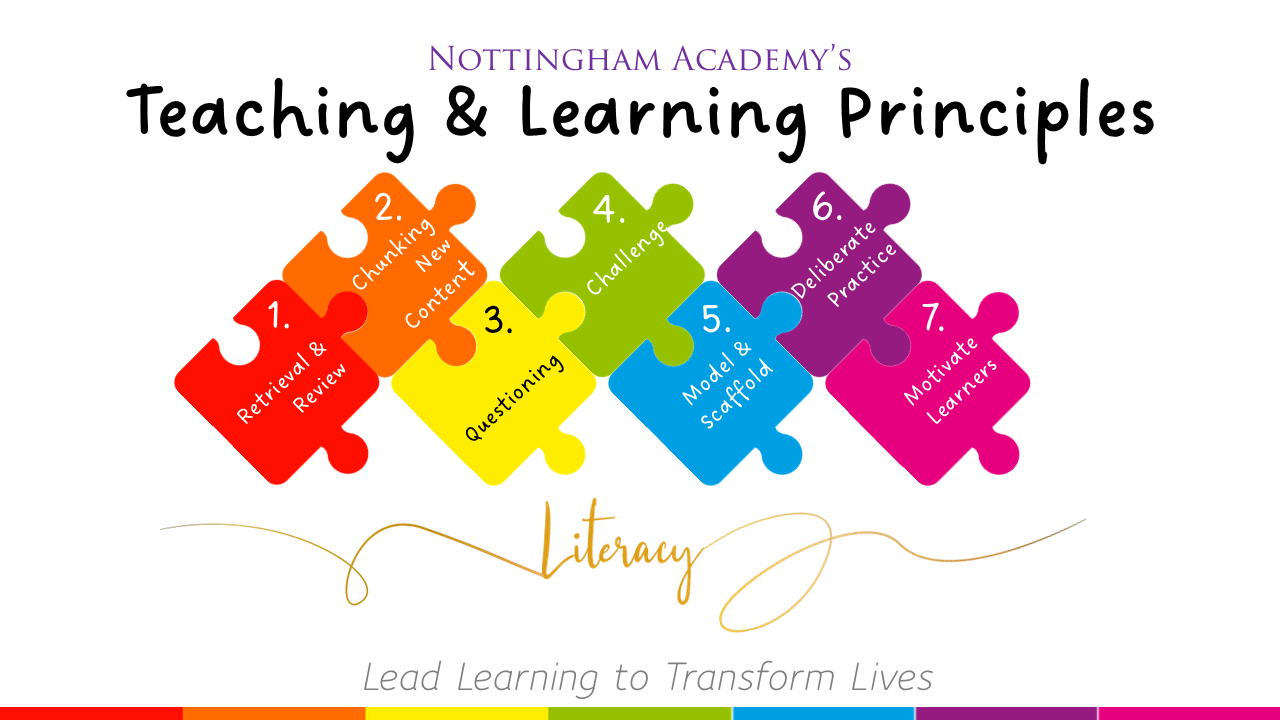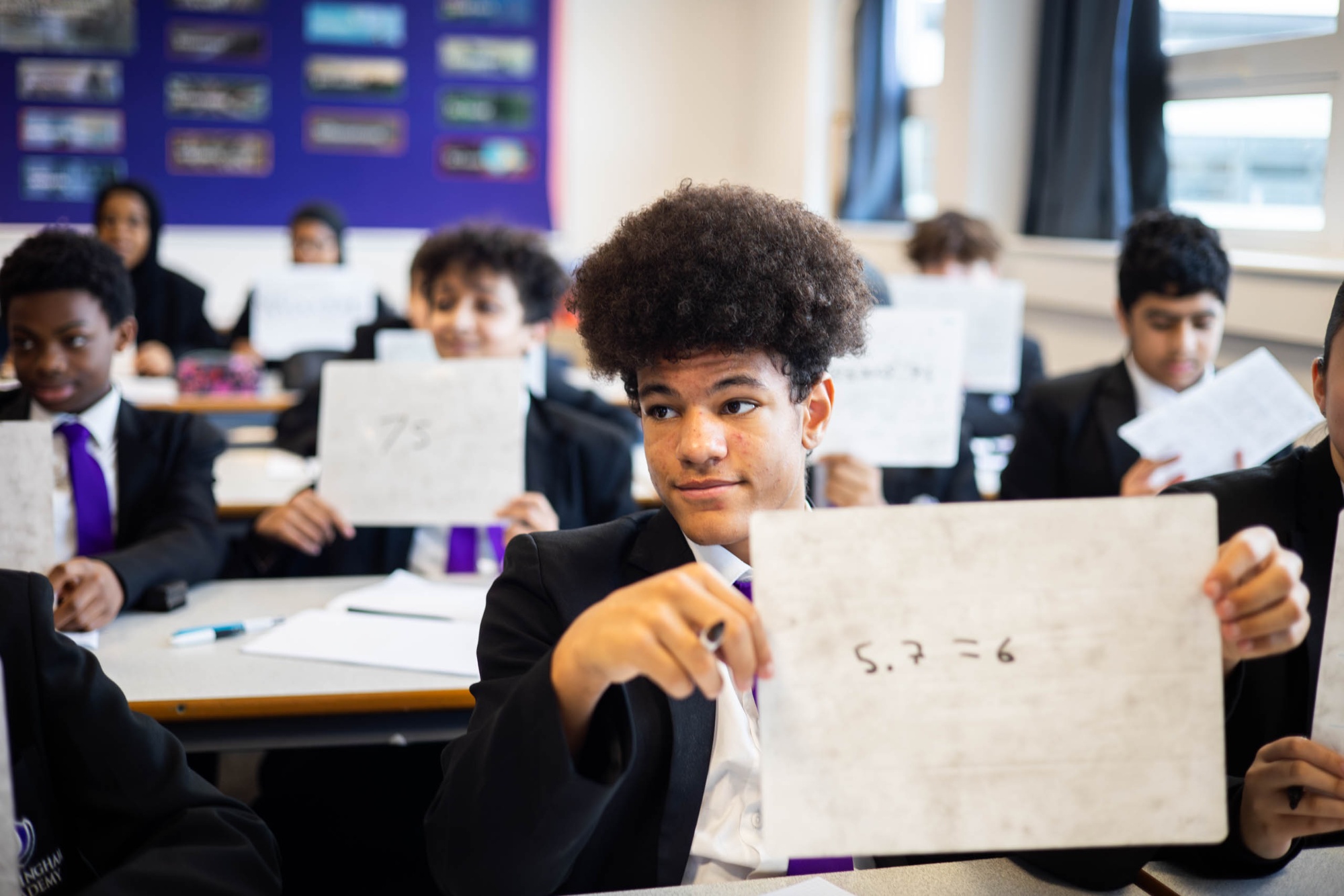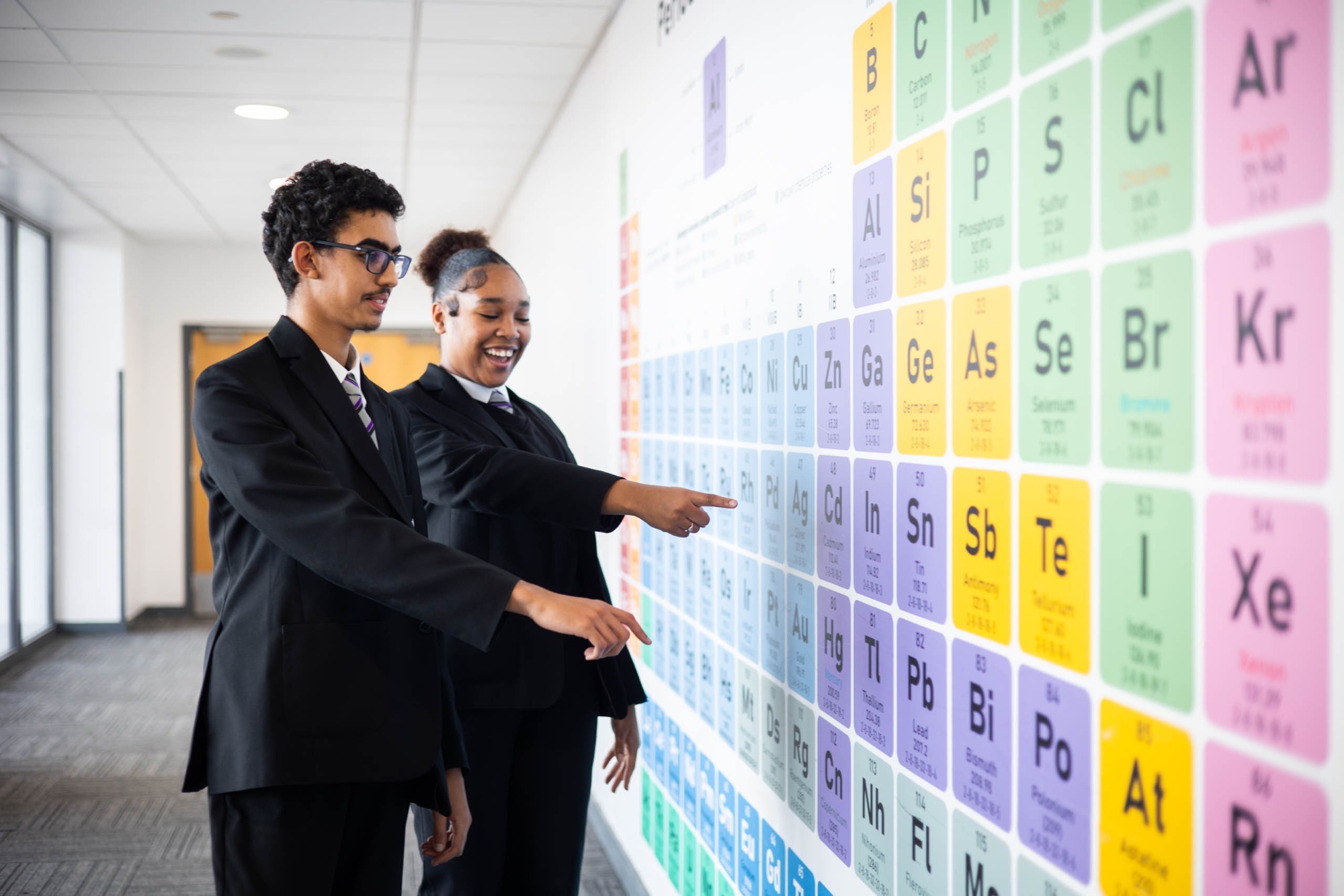Special Educational Needs and Disabilities

Welcome to SEND
Welcome to Nottingham Academy's SEND page
Here you will find all the essential information about our Special Educational Needs and Disabilities (SEND) provision, including access to our SEND Report, available for download.
Our aim is to ensure every child receives the support they need to thrive, and this page provides key resources and guidance for parents and carers.
Introducing our SENDCO

Ms B Morrison
Assistant Principal and SENDCo
Meet our dedicated SENDCO, Ms Morrison, who leads our Special Educational Needs and Disabilities provision. You can find their photo and contact information below.
What types of special educational needs (SEN) does the school support?
Our academy currently provides for pupils with the following needs:
- Communication and interaction: for example, autistic spectrum disorder, Asperger’s Syndrome (ASD), speech and language difficulties (SALT)
- Cognition and learning: for example, dyslexia, dyspraxia
- Social, emotional, and mental health difficulties: for example, attention deficit hyperactivity disorder (ADHD)
- Sensory and/or physical needs: for example, visual impairments, hearing impairments, processing difficulties.
What should I do if I think my child has special educational needs?
1. Tell us about your concerns:
If you think your child might have SEN, the first person you should tell is your child’s Head Of Year.
You can contact the Heads of Year via the email contact given on the school website. Please ensure that email the head of Year for your child.
They will pass the message on to the SEN Team who will contact you to talk about your concerns.
You can also contact the SEN Team directly nac_send@nottinghamacademy.org
2. We will invite you to a meeting to discuss them
We will meet with you to talk about your concerns and learn more about your child’s strengths and challenges.
Together we will decide what goals we want to achieve for your child and agree on the next steps.
We will write down what we talked about and add it to your child’s school record. You will also get a copy.
3. We will decide whether your child needs SEN support
If we decide that your child needs SEN support, we will tell you in writing and add your child to the school’s SEN register.
Who will help my child at school, and what training do they have?
Our special educational needs co-ordinator, or SENCO:
- Our SENCO is Mrs Baljinder Morrison
- Mrs Morrison has been a SENCo for 14 years and has also worked as Trust lead SENCo in her previous role before joining the Nottingham Academy. Mrs Morrison has worked in many different Local Authorities in her role as a SENCo and Trust lead SENCo.
- Mrs Morrison has been in education for 24 years 14 years in a leadership capacity. They are a qualified teacher.
- They achieved the National Award in Special Educational Needs Co-ordination in 2012.
- Mrs Morrison is a qualified to test pupils for examination support.
- They are allocated 3 days a week to manage SEN provision.
Subject Teachers:
- All our teachers receive in-house SEN training, and are supported by the SENCO to meet the needs of pupils who have SEN.
- We have taken part in the following training:
- Inset training on meeting the needs of EVERY pupil. SEN training will be ongoing throughout the year.
Learning Mentors:
- We have a team of 9 learning mentors, two R2I staff members who are trained to support pupils’ mental health.
- We have 3 learning mentors who are trained to deliver interventions.
- In the last academic year, some learning mentors have been trained in Lexonik, Little Wordle and Phonics training to support our pupils learning.
External agencies and experts:
Sometimes we need extra help to offer our pupils the support that they need. Whenever necessary we will work with external support services to meet the needs of our pupils with SEN and to support their families. These may include but are not limited to.
- Autism Team
- Learning Support Team
- Behaviour Support Team
- Sensory Team
- Speech and language therapists
- Educational psychologists
- Occupational therapists
How will the school know if my child needs extra support?
We use different steps and information from previous schools to decide if a student should be on the SEN register at Nottingham Academy.
In Year 7, all students take tests to check their learning levels. If students in Years 7 or 8 need extra help with reading, they will use programs like Reading Eggs, Phonics and Lexonik.
Teachers will adjust their teaching to help all students and check their progress regularly. This helps them find students who:
- Are making slower progress than others who started at the same level.
- Are not improving as quickly as they did before.
- Are not closing the gap with their peers.
When deciding if a student needs special help, we will consider what we want them to achieve and how they are doing. We will also consider the views and wishes of the student and their parents. This will help us decide what support is needed and whether we can provide it by adjusting our regular teaching or if we need to do something extra.
How will we be involved in decisions about their education?
We will talk with the students and their parents to decide if they need special help at school. These talks will make sure:
- We all understand what the student is good at and what they find difficult.
- We hear and think about the parents' concerns.
- We all know the goals we want to reach for the child.
- We are clear about what the next steps will be.
We will write down what we discuss and add it to the student's records, sharing this with the parents.
You will be invited to review the goals and support provided at least three times a year.
We will let parents know if we decide a student will get SEN support or if they no longer need it.
How will the school check my child’s progress?
We will follow the ‘graduated approach’ to meeting your child’s SEN needs.
The graduated approach is a 4-part cycle of Assess, Plan, Do, Review.

How will the school adapt their teaching to help my child?
Nottingham Academy uses 7 teaching principles to support good teaching and help all students, including those with special educational needs. The classroom teacher uses these principles and makes changes to lessons to meet the needs of all students. Some students will also get extra help from a learning mentor.

How will the school check if the support is helping my child?
We will check how well the support for your child is working by:
- Using APDR documents and school data to check progress each term.
- Reviewing how helpful interventions are after each cycle of assess-plan-do-review.
- Asking students to fill out questionnaires.
- Getting regular feedback from parents and carers
- SENCO (special needs coordinator) monitoring and analysing progress.
- Having an annual review if your child has an education, health, and care (EHC) plan.
How will the school include my child in activities with other children?
- All of our extra activities and school trips are open to all students, including before and after-school clubs.
- All students are encouraged to go on trips, including our residential trip(s).
- All students are encouraged to take part in sports day/school plays/special workshops. Pupils will get the support they require to fully participate from the SEND team.
- No student is ever left out of these activities because of their special educational needs (SEN) or disability. We will make any necessary changes to include them.
How does the school make sure children with SEN or disabilities are treated fairly when they apply?
- Our admissions arrangements make sure we will admit all children whose education, health, and care (EHC) plan names our academy.
- Our admissions arrangements make sure we will consider applications from parents of children with SEND but who do not have an EHC plan.
- Our academy has arrangements in place to cater for the needs of pupils with SEND. Arrangements include a clear approach to identifying and responding to SEND.
How does the school support children with disabilities?
Our school makes sure that all disabled pupils are treated fairly and given the same chances as everyone else.
- Fair Treatment: We teach our staff about disabilities to ensure everyone is treated equally and to prevent disabled pupils from being treated less favourably than other pupils. If a problem happens, we fix it right away.
- Additional support: For pupils with additional needs we have a team of learning mentors who support the implication of educational plans
- Facilities and Support: The school has ramps, lifts, and accessible toilets to help pupils get around easily. We also offer things like hearing aids or extra help for pupils who need it.
- Accessibility Plan: This plan shows how we: Make sure disabled pupils can join in all lessons and activities. Improve the school’s buildings to make them easier to use. Provide information in formats like large print or audio so it’s easier to understand.
How will the school help my child’s mental health and emotional development?
Our academy runs a program called Routes 2 Inclusion (R2i). This is a bespoke intervention Pathway run by Nottingham city Council. Routes to Inclusion also draws on the support of other agencies in the Local Authority and voluntary sector, in mapping services and provision, so that schools have a clear understanding of the support available and how this can be assessed in a timely and appropriate way. The graduated response is aligned to other processes in the Local Authority such as High Level Needs (HLN) requests and Education, Health and Care Plan (EHCP) requests.
Our academy has created a holistic framework to provide a systematic, graduated response to meeting the needs of children and young people with special educational needs and disabilities (SEND) for mental health and emotional development. This supports all SEMH pupils in our cohort of pupils. This is actioned with a needs analysis and bespoke tailored time-based interventions, targeted support and continued work within school and collaboration with external agencies.
What support will my child get when they move to a new year group or school?
Between phases
- The SENCO from the primary school meets with our SENCO at the end of the summer term to talk about the needs of new students.
- We arrange meetings with parents to discuss how we can help their child settle into our school.
- We give new students a buddy from the year above to help them feel comfortable and make friends.
Onto adulthood
- We give all students advice about future work or education options.
- We work with students to help them reach their goals, whether they want to go to college, get a job, live independently, or take part in the community.
Between schools
When your child is moving to a new school, we will ask you and your child what information you want us to share with the new school.
What extra help is there for children in care or who were in care and have SEN?
Nicky Brown (Designated teacher in charge of Looked after children) and Oliver Smith (LAC mentor) will work with Mrs Morrison, our SENCO, to make sure all teachers understand how being a looked-after or previously looked-after child and having SEN might affect learning and teaching.
Looked-after and previously looked-after children will get support like any other child with SEND. However, looked-after children will also have a personal education plan (PEP). We will make sure the PEP works well with any SEN support plans or EHC plans.
What should I do if I’m not happy with my child’s SEN support?
Complaints about SEN provision in our academy should be made to the SENCo.
The procedure for raising concerns or complaints is outlines in the SEN policy which is available on the website.
The parents of students with disabilities have the right to make disability discrimination claims if they believe that the academy has discriminated against their children. Parents can make a claim about alleged discrimination regarding:
- Suspensions and Exclusions
- Provision of education and associated services
- Making reasonable adjustments, including the provision of auxiliary aids and services
What support is available for me and my family?
The local authority local offer/ Contact details of support services for parents of students with SEN
Nottingham Academy is supported by a wide range of services, including:
- an educational psychologist.
- specialist teams from the Local Authority
- CAMHS
- Social Emotional Co-ordinator
- School Nurse
Any further information regarding the support services we use can be obtained by contacting the academy to discuss the local offer or by visiting Nottingham City’s ‘Ask Us’ website below:
www.asklion.co.uk/kb5/nottingham/directory/localoffer.page?directorychannel=7
The SEN team are available to discuss support available for your child and make the necessary referrals when appropriate to do so.
Provision
The following are examples of provision across Nottingham Academy. The provision offered in each academy will be matched to individual pupils through assessment and evaluation.
Cognition and Learning
Children and young people with cognition and learning needs may find it hard to develop skills in numeracy and literacy, learn more slowly than others at the same age. Additionally, they may have difficulty with concentration, speed with processing information, learning new vocabulary, and organising skills. Children may find it difficult to think and understand their way through their learning. A child’s needs will vary from individual to individual, and appropriate support is put in place to meet personal needs.
| Examples of Support in Our Academy | How we check it is working |
|---|---|
|
|
Communication and Interaction
Children and young people with communication and interaction needs may find it difficult to communicate with others from adults to their peers. They might find it hard to say what they want to or have trouble in understanding what is explained to them. They may also find it difficult to use or understand social rules of communication. Some children and young people with Autism Spectrum Disorder, including Asperger’s Syndrome and Autism, may have difficulties with social interaction. They may experience difficulties with language, communication, social interaction and imagination, and this can impact on how they relate to others and within the classroom environment.
| Examples of Support in Our Academy | How we check it is working |
|---|---|
|
|
Social, Emotional, and Mental Health Difficulties
Children and young people may experience a wide range of social and emotional difficulties, which are shown in different ways. Children might become withdrawn or isolated, or they may display challenging, disruptive or disturbing behaviour. These behaviours might reflect an underlying mental health difficulty such as anxiety or depression, self-harming, substance misuse, eating disorders or physical symptoms that are medically unexplained. Some children and young people may have other disorders such as attention deficit disorder, attention deficit hyperactive disorder or attachment disorder.
| Examples of Support in Our Academy | How we check it is working |
|---|---|
|
|
Sensory and/or Physical Needs
Children and young people may have a disability such as a hearing impairment (HI), vision impairment (VI) or multi-sensory impairment (MSI). The needs of the child or young person might mean that adaptations need to be made to resources and facilities in academy in order to ensure that the curriculum can be flexible to support everyone in their learning. These needs might change over time.
| Examples of Support in Our Academy | How we check it is working |
|---|---|
|
|
Accessibility
Improving the physical environment of academies to enable those with disabilities to take better advantage of education, benefits, facilities, and services provided.
Accessibility plans for both Nottingham Academy Primary sites are available to view and download below.
Nottingham Academy is committed to providing a fully accessible environment that values and includes all pupils, staff, parents, and visitors regardless of their education, physical, sensory, social, spiritual, emotional and cultural needs. We are committed to challenging negative attitudes about disability and accessibility and to developing a culture of awareness, tolerance, and inclusion.
SEND Report and FAQs
At Nottingham Academy we strive to achieve the highest standards to support pupils with Special Educational Needs and Disabilities (SEND). We promote an inclusive educational environment in which we support and encourage all pupils to reach their potential.
Quality teaching is vital; however, for some children, there are occasions when further additional support may be needed to help them achieve their targets. In order to do this, steps may be taken to support young people through their learning journey.
The Nottingham Academy works closely with the Local Authority in Nottingham in order to support our learners who are identified to have a need within the four areas of SEND, as identified by the DfE (SEN CoP 2014), download the document below for examples of support that may be available to pupils with additional needs, and further SEND information.
What can I expect if I send my child to the Nottingham Academy?
A personalised approach to learning with the relevant support and adjustments that will maximise your child’s learning and progress.
How does Nottingham Academy organise support for pupils with SEND?
The SENDco coordinates the relevant support for children with SEND. This includes, if required, additional adult support, intervention, tracking and collaboration with outside agencies.
How does Nottingham Academy support pupils with SEND through transition?
We work closely with our partner primary schools to ensure we have a thorough understanding of the individual needs of our pupils on entry.
The transition from primary to secondary education can be a difficult time for pupils. We develop careful plans to ensure our pupils are well-prepared for this move. For some pupils we offer a bespoke programme to help them have a smooth transition.
What support do we have for you as a parent of a child with SEND?
The SENDCo is available to meet with you to discuss your child’s progress or any concerns/worries that you may have.
All information from outside agencies and professionals will be shared with you in person or via written reports. The SENDCo will share any new assessments and support strategies suggested by outside agencies with you. You will be informed if a new support measure is put into place.
How can I let the school know that I am concerned about the progress that my child is making in the Academy?
If you have concerns about your child’s progress, you should speak initially with your child’s subject teacher, tutor or Head of Year. They will address your child’s needs through the Pastoral System; if your child is still not making progress then they may be referred to the SENDCo. If you are not happy that the concerns are being managed and that your child is still not making progress you should speak to the SENDCo or Assistant Principal or Principal.
If your child is in need of additional support, we offer a range of strategies at Nottingham Academy and you are encouraged to contact the above staff members at the top of this page for further information.


